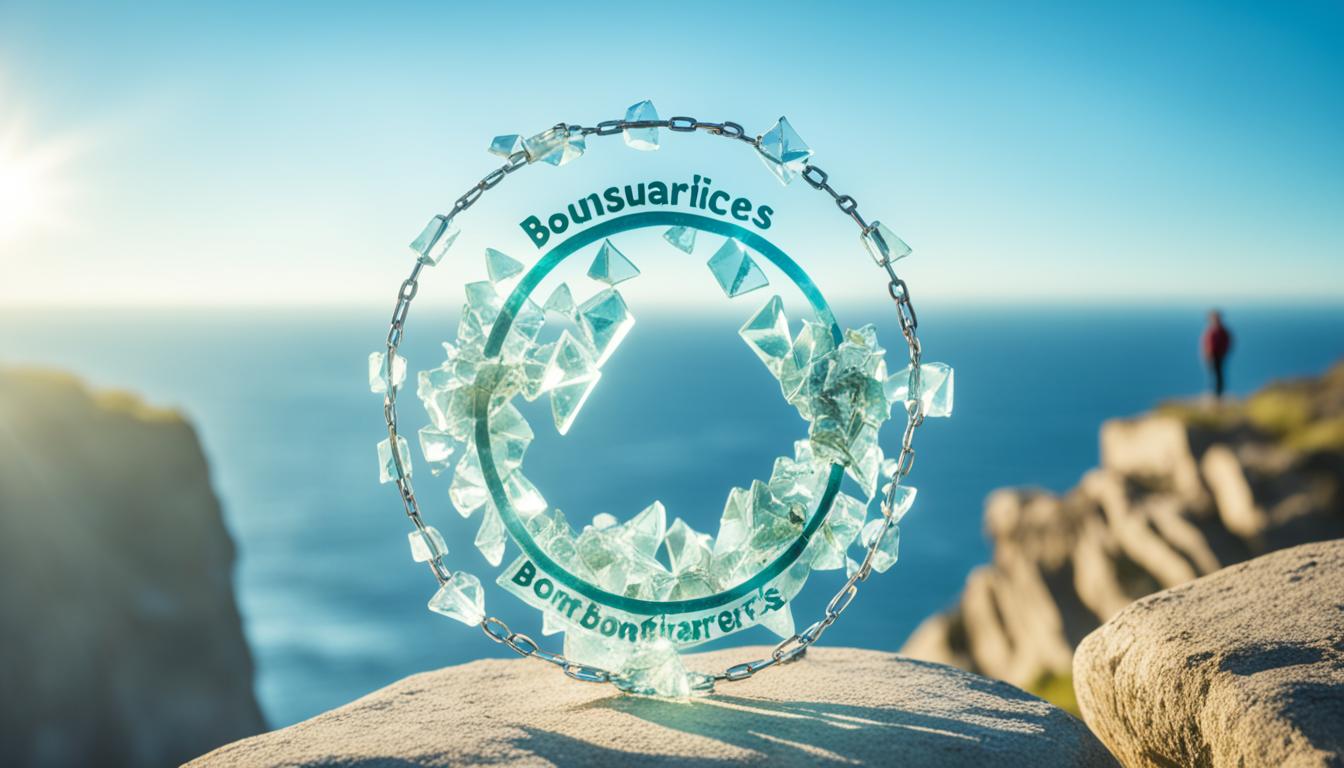Did you know that around 58 million people in the United States have experienced abuse at the hands of narcissists?
Narcissistic abuse is a form of emotional and psychological manipulation that can have devastating effects on survivors. It involves control tactics, manipulation, and the exploitation of others to meet the abuser’s needs.
Joining a narcissistic abuse support group can provide survivors with the emotional support, empathy, and valuable information they need to heal and rebuild their lives.
Key Takeaways:
- 58 million people in the United States have experienced narcissistic abuse.
- Narcissistic abuse involves manipulation, coercion, and control tactics.
- Support groups offer survivors emotional support and valuable information.
- Joining a support group can help survivors heal and rebuild their lives.
- Support groups provide a sense of community and understanding for survivors.
Understanding Narcissistic Abuse
Narcissistic abuse is a prevalent form of emotional and psychological abuse that can have devastating effects on survivors. Those who have experienced narcissistic abuse may face challenges in their relationships, financial stability, and self-image. It is crucial to understand the traits of narcissism and how they intersect with narcissistic abuse in order to effectively address the healing process.
Narcissistic abuse can occur in various settings, such as romantic relationships, family dynamics, and even in the workplace. The abusive behavior often involves manipulation, coercion, scare tactics, and control, all of which are aimed at maintaining power and dominance over the victim. Recognizing the different stages of the narcissistic abuse cycle is key to understanding its detrimental impact on a survivor’s mental health.
The first stage of the abuse cycle is idealization, where the narcissist showers the victim with affection, attention, and admiration. This phase creates a false sense of security and happiness, leading the victim to believe they have found their perfect partner or colleague. However, this blissful period eventually gives way to the devaluation stage, where the narcissist starts to devalue and criticize the victim. This includes belittling, gaslighting, and undermining their worth and achievements.
The devaluation stage is often followed by the discard stage, where the narcissist abruptly ends the relationship or withdraws their support and affection. This period can be incredibly traumatic for the survivor, as they are left feeling abandoned, confused, and devastated. The cycle then restarts with the narcissist attempting to draw the victim back into the relationship through hoovering, further perpetuating the toxic cycle of abuse.
It is important to note that narcissistic abuse is not limited to romantic relationships. It can also manifest in other contexts, such as familial relationships and professional environments. Family members who exhibit narcissistic traits may emotionally manipulate and control their loved ones, creating a toxic and oppressive dynamic. In the workplace, narcissistic individuals may engage in power plays, taking credit for others’ achievements, and undermining their colleagues’ professional growth.
Effects of Narcissistic Abuse
The effects of narcissistic abuse can be long-lasting and deeply impactful on a survivor’s well-being. Some common consequences include:
- Emotional trauma: Survivors may experience anxiety, depression, post-traumatic stress disorder (PTSD), and low self-esteem as a result of the abuse.
- Isolation: Narcissistic abusers often isolate their victims from friends, family, and support systems, leaving them feeling lonely and disconnected.
- Financial instability: Economic abuse is a tactic frequently employed by narcissistic abusers, leaving the victim financially dependent and vulnerable.
Healing from narcissistic abuse requires a comprehensive approach that includes therapy, support groups, and self-care strategies. Recognizing the signs of narcissistic abuse is an important step in breaking the cycle and starting the journey of recovery and healing.
| Signs of Narcissistic Abuse | Impact on Survivor |
|---|---|
| Constant criticism and belittling | Low self-esteem and self-worth |
| Manipulation and gaslighting | Confusion, self-doubt, and anxiety |
| Isolation and control | Feelings of loneliness and helplessness |
| Lack of boundaries and respect | Loss of personal identity and autonomy |
The Importance of Support Groups for Narcissistic Abuse Survivors
Narcissistic abuse survivors often feel isolated, alone, and abandoned. The emotional and psychological impact of narcissistic abuse can leave deep scars that take time and support to heal. This is where support groups play a crucial role in the recovery process.
Support groups provide a safe and non-judgmental space for survivors to share their experiences, connect with others who have gone through similar situations, and receive the emotional support they need. In these groups, survivors can find solace in knowing that they are not alone in their struggles.
Being able to openly discuss the effects of narcissistic abuse with others who truly understand can be incredibly therapeutic. It allows survivors to feel heard and validated, which can be transformative in the healing journey. Hearing stories of resilience and strength from fellow survivors can offer hope and inspiration.
The Power of Emotional Support
Emotional support is a crucial component of the healing process for narcissistic abuse survivors. It provides reassurance, validation, and a sense of belonging. By participating in support groups, survivors can find comfort in knowing that others have faced similar challenges and have come out stronger on the other side.
Support groups offer survivors the opportunity to express themselves freely, without fear of judgment or criticism. This can be particularly empowering for individuals who have been silenced or gaslighted during their experience with narcissistic abuse.
Receiving emotional support from others who have overcome narcissistic abuse can help survivors regain their self-esteem and self-worth. It provides a space for survivors to rebuild their confidence, embrace their individuality, and rediscover their identity outside of the abusive relationship.
Complementing Therapy for Recovery
While individual therapy is essential for survivors of narcissistic abuse, support groups complement this therapy by providing a strong social support network. Therapy can help survivors process their trauma on a deeper level, but support groups offer a unique sense of camaraderie and shared understanding.
Support group sessions are an opportunity for survivors to learn from one another, share coping strategies, and gain insights into their own healing process. Survivors can exchange advice, techniques, and resources that have been helpful in their journey of recovery from narcissistic abuse.
This combination of individual therapy and support group participation creates a comprehensive approach to healing. Survivors can benefit from the professional guidance of therapists while also drawing strength and inspiration from the collective wisdom and experiences of their peers.

“Support groups create a safe space for survivors to share their stories and feelings without fear of judgment.”
In conclusion, support groups play an integral role in the healing journey of narcissistic abuse survivors. They offer emotional support, validation, and a sense of community to individuals who have experienced the detrimental effects of narcissistic abuse. By providing a space for survivors to heal and rebuild their lives, support groups contribute to the empowerment and resilience of those affected by narcissistic abuse.
The Benefits of Narcissistic Abuse Support Groups
Joining a narcissistic abuse support group can be a powerful step towards healing and recovery. These groups provide survivors with a sense of community, understanding, and validation. Here are some of the key benefits of participating in a support group:
1. Connection with others who have similar experiences
Support groups allow survivors to connect with individuals who have gone through similar abuse. This connection provides a sense of belonging and eliminates the feeling of isolation that often accompanies narcissistic abuse. Sharing experiences and stories with others who understand can be incredibly healing and empowering.
2. Safe space for sharing and emotional expression
Support groups create a safe and non-judgmental space for survivors to share their stories, emotions, and struggles. It can be liberating to express feelings without fear of being dismissed or invalidated. Sharing experiences in a supportive environment can help survivors gain perspective, process their emotions, and take steps towards healing.
3. Education and understanding about narcissism
Support groups often provide education about narcissism and its effects on survivors. Understanding the dynamics of narcissistic abuse can help survivors make sense of their experiences and validate their feelings. Learning about narcissistic traits, manipulation tactics, and the abuse cycle empowers survivors to recognize red flags and protect themselves in the future.
4. Guidance on healing and recovery
Support groups offer valuable guidance on healing and recovery after narcissistic abuse. Survivors can learn coping strategies, self-care techniques, and tools for rebuilding their lives. Group members share their personal journeys and offer insights and advice based on their own experiences. This collective wisdom provides hope, inspiration, and practical guidance for survivors on their healing journey.
5. Convenience and accessibility of online support groups
Online support groups provide convenience and accessibility for survivors who may not have local support options available. These groups can be accessed from the comfort and privacy of one’s own home, making it easier for individuals who may be hesitant to attend in-person meetings. Online support groups also cater to different time zones and schedules, ensuring that survivors can find and join a group that suits their needs.

Overall, narcissistic abuse support groups serve as a vital resource for survivors. They provide a safe and empowering space where individuals can connect, heal, and rebuild their lives after experiencing narcissistic abuse.
What to Expect in a Narcissistic Abuse Support Group
Narcissistic abuse support groups aim to provide survivors with the necessary tools and support to reclaim their lives and thrive after enduring narcissistic abuse. These support groups offer a safe and nurturing environment where participants can heal, learn coping skills, and develop a strong support network.
In a narcissistic abuse support group, survivors can expect to:
- Learn coping skills to manage the effects of narcissistic abuse on their mental and emotional well-being
- Establish daily routines that promote self-care and emotional stability
- Develop a strong support network of individuals who understand and validate their experiences
Participants in these groups are encouraged to engage in positive self-talk, practice affirmations, and validate their own feelings and experiences. They learn the impact of narcissism, dissect narcissistic traits, and become adept at recognizing warning signs to prevent further abuse.
In addition, survivors explore their own susceptibilities to narcissistic abuse, guiding them towards self-reflection and personal growth. They learn to purge and release negative emotions accumulated from the abuse, forging a path towards forgiveness and self-growth.

| What to Expect in a Narcissistic Abuse Support Group | Benefits |
|---|---|
| Learn coping skills | Developing resilience and emotional strength |
| Establish daily routines | Creating structure and stability in life |
| Develop a strong support network | Feeling understood, validated, and supported |
| Engage in positive self-talk | Promoting self-esteem and self-worth |
| Dissect narcissistic traits | Understanding the dynamics of abuse |
| Recognize warning signs | Preventing further abuse |
| Explore susceptibilities to abuse | Developing self-awareness and personal growth |
| Purge and release negative emotions | Forging a path towards healing |
How to Find a Narcissistic Abuse Support Group
Looking for a support group can be an important step in healing from narcissistic abuse. Here are some ways to find a narcissistic abuse support group:
- Contact a mental health provider: Consult with a mental health provider who can provide referrals to local support groups. They can guide you to resources that specialize in helping survivors of narcissistic abuse.
- Domestic violence centers: Domestic violence centers often run support groups for survivors of intimate partner violence, including narcissistic abuse. Reach out to local centers to inquire about the availability of support groups.
- Utilize online resources: Online resources such as the National Domestic Violence Hotline can provide tools to find support groups in your area. They offer comprehensive databases and directories of local resources.
- Online platforms: Help Within Reach and I Believe Your Abuse are online platforms that provide directories of therapy and support group resources. These platforms can help you find online support groups if you prefer virtual connections.
Remember, finding a support group that resonates with you is crucial for your healing journey. Take the time to research different options and choose a group that aligns with your needs and preferences.

The Role of Individual Counseling and Group Therapy
Individual counseling and group therapy play vital roles in the healing process for survivors of narcissistic abuse. They offer different but complementary approaches to support and empower individuals on their journey to recovery and rebuilding their lives.
The Importance of Individual Counseling
Individual counseling is a personalized and confidential therapeutic setting where survivors can work one-on-one with licensed mental health counselors or certified life coaches. This form of counseling provides a safe space for survivors to process their pain, trauma, and emotions associated with narcissistic abuse.
Through individual counseling, survivors can:
- Gain a deeper understanding of the dynamics of narcissistic abuse
- Explore and heal from the negative effects of the abuse
- Develop effective coping strategies and self-care routines
- Enhance their self-esteem and self-worth
- Set goals for personal growth and overcome challenges
Individual counseling allows survivors to focus on their unique needs and experiences, providing them with the tools and support necessary for healing and moving forward.
The Power of Group Therapy
Group therapy offers survivors the opportunity to connect with others who have also experienced narcissistic abuse. In a group setting facilitated by licensed mental health professionals, survivors can share their stories, gain validation, and learn from the collective wisdom of the group.
Benefits of group therapy for survivors include:
- Validation and reassurance that they are not alone in their experiences
- Validation and reassurance that they are not alone in their experiences
- Learning from others who have gone through similar trauma
- Developing empathy and understanding for oneself and others
- Gaining different perspectives and insights on healing and recovery
Group therapy fosters a sense of belonging and community, which can be incredibly empowering for survivors. It provides a safe and supportive environment where individuals can share their feelings, challenges, and successes with others who truly understand their journey.
Combining Individual Counseling and Group Therapy
Both individual counseling and group therapy are valuable components of the healing process for survivors of narcissistic abuse. While individual counseling provides personalized support, group therapy offers a collective experience that helps survivors feel seen, heard, and understood.
By combining individual counseling and group therapy, survivors can benefit from:
- Working through individual issues and trauma in a private setting
- Gaining insights, perspectives, and support from others in a group setting
- Developing a comprehensive support system for their recovery journey
- Receiving both individualized attention and the power of collective healing
Together, individual counseling and group therapy provide survivors with the tools, support, and validation they need to heal from narcissistic abuse and create a fulfilling and empowered life.

Benefits of Joining a Narcissistic Abuse Support Group
Joining a narcissistic abuse support group provides survivors with a safe space to share, learn, and heal. These groups offer validation, support, and understanding from individuals who have gone through similar experiences. Survivors can develop a sense of belonging and connection, which helps to combat the feelings of isolation that often accompany narcissistic abuse. Support groups also provide education, resources, and tools for healing and moving forward from toxic relationships. It is a place where survivors can find strength, resilience, and empowerment.
Validation, Support, and Understanding
A key benefit of joining a narcissistic abuse support group is the validation, support, and understanding survivors receive. In these groups, individuals can openly share their experiences without fear of judgment or disbelief. Survivors often find solace in knowing that they are not alone and that others have faced similar challenges. This validation helps to validate their experiences, emotions, and reactions to the abuse they endured.
Sense of Belonging and Connection
Narcissistic abuse can leave survivors feeling isolated and disconnected from others. Joining a support group provides an opportunity to connect with individuals who have firsthand experience with narcissistic abuse. Building relationships with others who truly understand can create a sense of belonging and connection that is essential for healing. Survivors can form supportive friendships and establish a network of people who are on a similar healing journey.
Educational Resources and Tools
Survivors of narcissistic abuse often need education and information to understand the dynamics of toxic relationships and the impact of narcissistic behaviors. Support groups provide access to educational resources and tools that help survivors navigate their healing journey. Group members can share insights, recommendations, and strategies for coping with the aftermath of abuse. These resources empower survivors with knowledge and skills needed for healing and rebuilding their lives.
Healing and Moving Forward
Support groups are a stepping stone towards healing and moving forward from toxic relationships. In these groups, survivors can learn effective coping mechanisms, gain self-awareness, and develop strategies for self-care. They can explore different healing modalities, such as therapy, mindfulness practices, and self-reflection. By participating in support groups, survivors can find the strength, resilience, and empowerment necessary to reclaim their lives and create a future free from the effects of narcissistic abuse.
| Benefits of Joining a Narcissistic Abuse Support Group |
|---|
| Validation, support, and understanding from individuals who have experienced similar abuse |
| A sense of belonging and connection with others on a healing journey |
| Access to educational resources and tools for healing and recovery |
| Opportunity to develop coping mechanisms and strategies for moving forward |
| Strength, resilience, and empowerment to overcome the effects of narcissistic abuse |
By joining a narcissistic abuse support group, survivors can gain the support and resources they need to heal from toxic relationships and build a brighter future.

The Journey of Healing from Narcissistic Abuse
Healing from narcissistic abuse is a challenging and transformative journey that survivors embark on. It requires time, patience, and a commitment to self-reflection. Throughout the healing process, survivors may experience a rollercoaster of emotions ranging from sadness and anger to guilt and shame. It is crucial for survivors to acknowledge and process these emotions in order to release them and move forward towards healing.
At times, it may be difficult for survivors to see themselves as anything other than victims. However, it is important to recognize the immense strength and resiliency that lies within each survivor. They are not just victims; they are victors who have overcome unimaginable pain and adversity.
The healing journey involves reframing the experience of abuse and turning the pain into power. This involves reclaiming one’s sense of self, rebuilding confidence, and setting healthy boundaries. It requires survivors to embrace courage and have faith in their ability to heal and thrive.
Throughout the healing journey, survivors are encouraged to seek support from therapists, support groups, and loved ones. These support systems play a crucial role in providing guidance, validation, and encouragement. They create a safe space for survivors to share their stories, be heard, and receive the support they need.
In addition to seeking support, survivors are encouraged to engage in self-care practices that promote healing and well-being. This may include activities such as journaling, meditation, exercise, and creative expression. Taking care of one’s physical, emotional, and mental health is an essential part of the healing journey.
The healing journey from narcissistic abuse is not linear. It is a process of ups and downs, breakthroughs and setbacks. But with each step taken towards healing, survivors become stronger and more resilient.
As survivors progress on their healing journey, they begin to rebuild their lives on their own terms. They set goals, pursue new passions, and surround themselves with healthy relationships. They learn to embody forgiveness, not for the sake of the abuser, but for their own peace and liberation.
The journey of healing from narcissistic abuse is about embracing one’s true self, breaking free from fear and limitations, and creating a future filled with love, joy, and empowerment. It is a courageous and transformative path that survivors walk, reclaiming their lives and emerging as the resilient, vibrant individuals they were always meant to be.

Conclusion
Healing from narcissistic abuse is possible with the right support. Support groups provide survivors with a safe space to share their experiences, receive validation, and gain the tools and resources needed for healing and empowerment. By joining a narcissistic abuse support group, survivors can begin their journey toward healing, rebuild their lives, and create a future free from the effects of abuse.
Abuse is never the survivor’s fault, and everyone deserves a healthy and supportive relationship. Support groups for survivors of narcissistic abuse offer emotional support and a strong community where individuals can find solace, understanding, and guidance. Through these groups, survivors can connect with others who have experienced similar abuse, gaining a sense of belonging and validation. The power of healing lies in sharing experiences, learning from one another, and drawing strength from each other’s stories.
If you or someone you know has experienced narcissistic abuse, consider reaching out to a support group in your area or exploring online options. Remember, healing is a journey, and with the right support, survivors can reclaim their lives, rebuild their self-esteem, and move forward towards a brighter future. You are not alone, and there is hope for a life beyond narcissistic abuse.
FAQ
What is narcissistic abuse?
Narcissistic abuse is a form of emotional and psychological abuse that utilizes manipulation, coercion, scare tactics, and control. It can have devastating effects on a survivor’s relationships, finances, and self-image.
What types of relationships can narcissistic abuse occur in?
Narcissistic abuse can occur in romantic relationships, family dynamics, and even in the workplace. It is essential to recognize the stages of the abuse cycle and the impact it can have on a survivor’s mental health.
How can joining a narcissistic abuse support group help survivors?
Joining a narcissistic abuse support group provides survivors with emotional support, empathy, and valuable information. These groups create a safe space where survivors can share their experiences, feel heard and understood, and receive validation.
What are some benefits of joining a narcissistic abuse support group?
Joining a support group allows survivors to connect with others who have experienced similar abuse, providing a sense of community and understanding. These groups also offer education about narcissism, help survivors validate their experiences, and offer guidance on healing and recovery.
What can I expect in a narcissistic abuse support group?
In a support group, survivors can expect to develop coping skills, self-esteem, and gain insights from others who have gone through similar experiences. These groups also focus on educating survivors about narcissism, recognizing warning signs, and exploring susceptibilities to narcissistic abuse.
How can I find a narcissistic abuse support group?
You can consult with a mental health provider for referrals to local support groups. Domestic violence centers often run support groups for survivors of intimate partner violence, including narcissistic abuse. Online resources such as the National Domestic Violence Hotline, Help Within Reach, and I Believe Your Abuse provide directories of therapy and support group resources.
What is the role of individual counseling and group therapy in healing from narcissistic abuse?
Individual counseling helps survivors process the pain, understand narcissistic abuse dynamics, and develop effective recovery strategies. Group therapy offers survivors the opportunity to share their experiences, be validated, and learn from others who have gone through similar trauma.
What are some benefits of joining a narcissistic abuse support group?
Joining a narcissistic abuse support group provides survivors with a safe space to share, learn, and heal. These groups offer validation, support, and understanding from individuals who have gone through similar experiences. Survivors can develop a sense of belonging and connection, which helps combat the feelings of isolation that often accompany narcissistic abuse.
What is the journey of healing from narcissistic abuse?
Healing from narcissistic abuse is a process that requires time, support, and self-reflection. It involves recognizing and processing a range of emotions, reframing the experience, and rebuilding confidence. The healing journey also includes setting goals and living a life free from fear and limitations.
How can I heal from narcissistic abuse with support groups?
By joining a narcissistic abuse support group, survivors can begin their journey toward healing, rebuild their lives, and create a future free from the effects of abuse. These support groups provide a safe space to share experiences, receive validation, and gain tools and resources for healing and empowerment.










